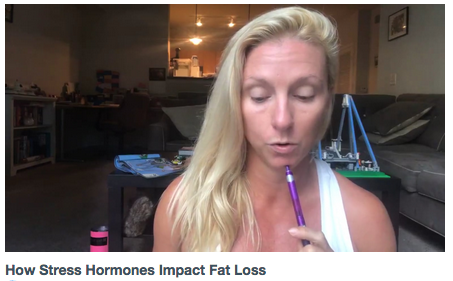Stress is going to impact our lives whether you like it or not. No meal plan and no workout schedule is going to be able to help you reach your personal fitness goals if you have chronic stress. You may even be doing yourself more hard than good with your workout schedule and meal plan. Find out more in this video..
[video_player type=”embed” style=”1″ dimensions=”560×315″ width=”560″ height=”315″ align=”center” margin_top=”0″ margin_bottom=”20″ ipad_color=”black”]![]() [/video_player]
[/video_player]
We have two types of stress hormones: cortiol and catecholamines. Catecholamines are epinephrine and nor-epinephrine or adrenaline and nor-adrenaline. Short lived stress is good for fat loss, long term stress is bad.
Short lived stress examples are simply exercise. Doing quick HIIT workouts, metcons, quick runs, spin class, etc. Long term stress examples are chronic over exercising, chronic under eating, chronic sleep deprivation, illness, etc. Then mental and emotional stressors like financial stress, relationship stress, work stress, etc.
Chronic elevation can lead to leptin resistance (the hormone that tells our brain that we have eaten enough and we are full and satisfied) as well as insulin resistance as cortisol naturally increases our insulin levels. So, for example, if we go too long without eating or sleeping we get insatiable cravings, and our insulin is chronically high which can lead to fat storage. Not only that, but chronic under eating can also cause our muscles to release amino acids from themselves to have for energy, which causes muscle loss as well. If you want to learn more about chronically elevated insulin, go here.
It is also important to know that when cortisol hangs with increased insulin, cortisol stores the heck out of some fat. BUT, when cortisol hangs with HGH and testosterone, it burns fat. And we will talk about that in a moment.
As for the catecholamines, they are really similar to cortisol in how stress impacts them and how they work in our bodies. They are fat burning unless they are chronically stimulated by stress. But one thing that can really put stress on our catecholamines is not getting enough carbohydrates, especially for a person that needs more carbs.
So.. how do you know when your cortisol and catecholamines are out of whack? First, you will notice that your hunger, energy and cravings are out of whack. You may be far hungrier than usual and you are craving salty or sugary foods more than usual. You may also find yourself way more tired. And it could even get to the point where you feel wired but tired. So you wake up and feel fine then as the day progresses, you are soooo sleepy, then at night you can’t sleep. That’s a major indicator that your stress hormones are way out of whack.
Too much stress can lead to muscle loss, fat gain, adrenal fatigue, thyroid dysfunction, other hormone imbalances such as estrogen/ progesterone imbalance, PCOS, inability to procreate, high blood pressure and belly fat/ bloat, gut dysfunction and lack of nutrients as your gut cannot break down food properly. This is just the tip of the iceberg.
To fix your stress hormones, your first need to recognize the cause and eliminate it the best you can. If it’s something you cannot change, you need to recognize your best coping mechanisms to help your mind. If it’s a physical stressor like over exercise, you need to back off, if it’s under eating, you need to eat more. For some people they simply need to eat more carbs, which is an easy fix. For some, they need to eat a bit more before they go to sleep.
You need to sleep more, period. To find out more about sleep, read this. Sleep increases our HGH and testosterone and it lowers our cortisol, catecholamines and insulin.
If you have inflammation or stress due to foods, eliminate them. But if your stress is not due to inflammatory foods, eliminating them can still be helpful for some people. Known inflammatory foods are gluten/ other grains, dairy, soy, sugar, fake sugar, nightshades and legumes. Then you need to replace those foods with foods that help your gut such as aloe juice, coconut, fermented foods, apple cider vinegar and supplements such as glutamine, digestive enzymes and pro-biotics.
Adding in time in nature, leisure walking, yin yoga and lifting without cardio can help.
Adding supplements such as the ones I mentioned above, along with magnesium and adrenal supporting herbs.
Do you need help figuring out the right clean eating meal plan for you?
Go to Commit2FitCoaching.com/freeassessment and let me help you.
Your Coach,
Kyra
P.S. Everyone is different. Some people need more carbs, more food, different workouts from others. It’s all individualized which is why I run #Commit2Fit with personalized clean eating meal plans and workout plans. Everything should be custom and designed specifically for YOU.
